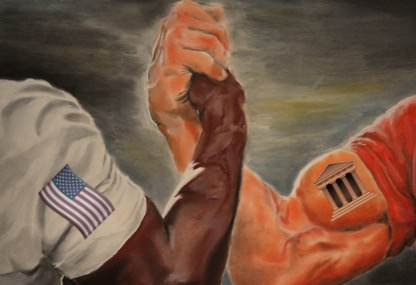The Real Reagan
![Linda Chavez [Misc.];Ronald W. Reagan](https://americanmind.org/wp-content/uploads/2024/04/GettyImages-50313478.jpg)
Getting beyond the caricatures of the conservative president.
What are contemporary conservatives to make of Ronald Reagan and his still contested legacy? Today, the 40th President of the United States remains a robust presence in intra-conservative debate and discourse, but one that is more used and abused than truly understood and appreciated.
Some of the shriller voices on the New Right speak of Reagan (and Reaganism) with a contempt rooted in ignorance mixed with youthful impatience and ingratitude. They flail at a caricature of their own making and blame Reagan in no small part for our present rot, and for the lethargy and seeming blindness to our current civic and moral crisis that characterizes much of the conservative establishment and donor class. They fail to appreciate the multiple ways in which Reagan might sympathize with their concerns.
On the other side, faux Reaganites prattle on about freedom without sharing Reagan’s deep appreciation of its essential moral foundations and his oft-stated conviction that liberty must always be “under God”—and not confused with license or the willful neglect of our civic and moral obligations.
Moreover, those with neoconservative inclinations confuse Reagan’s principled opposition to inhuman communist ideology and the “Evil Empire” with hatred of Russia per se. There is no reason to believe that Reagan would have welcomed permanent enmity between Russia and the West or that fierce and unbending opposition to Russia would have been central to his vision of a post-Cold War foreign policy. One can rightly oppose the maladies of Russian nationalism without becoming a fevered Ukrainian nationalist in turn, or in attempting to endlessly perpetuate Cold War tensions in a radically different “diplomatic-strategic constellation,” to cite a pertinent phrase of Raymond Aron’s.
Conservatives who rightly think that Western intransigence contributed to the outbreak of the Russo-Ukrainian War (including ill-advised support for the Maidan Revolution—which irrevocably tore the two halves of Ukraine apart—and support for indefinite NATO expansion) in no way requires denying Russian culpability for the invasion of Ukraine.
Additionally, comparing Putin to Hitler and Stalin is hardly Reaganite and has the added difficulty of being woefully hyperbolic. Condemning this overwrought comparison does not make one a contemporary Walter Duranty, a truly shameless apologist for mass terror and murderous collectivization, as one writer suggested in Commentary after the outbreak of the Ukraine War in the spring of 2022.
Nor would Reagan have joined the assault on nations like Hungary or Poland (at least under the rule of the Law and Justice Party) for defending national sovereignty, upholding the Christian inheritance of Europe, or opposing gender ideology and other politically correct impositions of the woke imperium. All this has little in common with the pre-1989 NATO alliance or European Union.
In addition, too many self-described “Reaganites” (and Bushies) have accommodated a reckless and coercive cultural revolution that Reagan never would have sanctioned. They are perfectly content with being woke adjacent in the name of a conception of freedom that Ronald Reagan would not have recognized.
Nor was Reagan an inflexible ideologue, even if he always remained a proud, principled conservative. In a wonderful speech to the Fourth Annual Conservative Political Action Conference on February 6, 1977, he insisted that conservatism had nothing to do with ideology or “ideological purity.” American conservatism is at once “principled” and “free from slavish adherence to abstraction.” When an American conservative defends the market economy “he is merely stating what a careful examination of the real world has told him is the truth.” When a conservative adamantly opposes communist totalitarianism, “he is not theorizing—he is reporting the ugly reality captured so unforgettably in the writings of Alexander Solzhenitsyn.” And when conservatives favor government that is close to the people—and not one that is distant, bureaucratic, and intrusive—they build on the experience and wisdom of our founding fathers who risked their lives, fortunes, and sacred honor to save free men and women from “an ideology of empire.”
For the half-populist Reagan, true conservatism must remain rooted in “the common sense and common decency of ordinary men and women.” It has nothing to do with “the kind of ideological fanaticism that has brought horror and destruction to the world.” At the same time, Reagan fully appreciated that common sense must be rekindled and renewed by faith in Divine Providence and a commitment to a “political philosophy” that cherishes families, churches, neighborhoods, and communities—“the institutions that foster and nourish values like concern for others and respect for the rule of law under God,” as he described in his “Evil Empire” speech.
In that same 1983 address, Reagan emphasized the theistic character of the Declaration of Independence (with no less than four references to the Supreme Being). He could not imagine a conception of freedom that severed itself from the rich moral and civilizational inheritance that is the “Judeo-Christian inheritance.” Citing William Penn, he unhesitatingly affirmed that “If we will not be governed by God, we must be governed by tyrants.” He took solace in the fact that in 1983, “ninety-five percent of those surveyed” by pollsters “expressed a belief in God and a huge minority believed the Ten Commandments had real meaning in their lives.”
But the “deep reverence for the importance of family ties and religious belief” that President Reagan applauded in that same speech is in steep if not terminal decline, and the moral foundations of a free republic that were so precious to him matter less and less for Americans, including for many so-called “Reaganites.” It is no longer “Morning in America.”
President Reagan rightly identified socialism with the confiscation of human liberty and dignity and capitalism, rightly understood, with freedom. The rebirth of sympathy for socialism, and even communism, among so many intellectuals (and young people) today would deeply disturb him. He would undoubtedly oppose the flirtation of some on the New Right with “industrial policy,” which government lacks the competence to perform and simply delays the inevitable demise of “industrial museums.”
But Reagan would also no doubt be appalled by woke capitalism and Davos-style “globalism.” He would have judged post-Cold War free trade by its fruits and not according to abstract theorizing. And it is important to remember that Reagan grew less and not more “libertarian” with the passing of years. He regularly lauded free associations and the rich array of intermediate institutions between the state and increasingly atomized individuals. Patriotism and gratitude were essential features of the public philosophy he promoted.
Last but not least, this former governor of California who in 1967 had signed into law an ill-advised bill legalizing abortion in California later fought adamantly against abortion-on-demand. In his wise and memorable article “Abortion and the Conscience,” published in the Human Life Review in the spring of 1983, he eloquently argued that “we cannot diminish one category of life—the unborn—without diminishing the value of all human life.” The late president could not go along with his misguided fellow citizens who “want to pick and choose which individuals have value.”
Ronald Reagan continues to surprise if we take our bearings from his principled common sense and not the caricatures of his speech and deeds that are far too abundant across the spectrum of conservative opinion today.
The American Mind presents a range of perspectives. Views are writers’ own and do not necessarily represent those of The Claremont Institute.
The American Mind is a publication of the Claremont Institute, a non-profit 501(c)(3) organization, dedicated to restoring the principles of the American Founding to their rightful, preeminent authority in our national life. Interested in supporting our work? Gifts to the Claremont Institute are tax-deductible.
And how to flip it back.
Americans must forge a path ahead.
Reviving the Hamiltonian spirit in an era of populism.
But humility, courage, and loyalty might.






